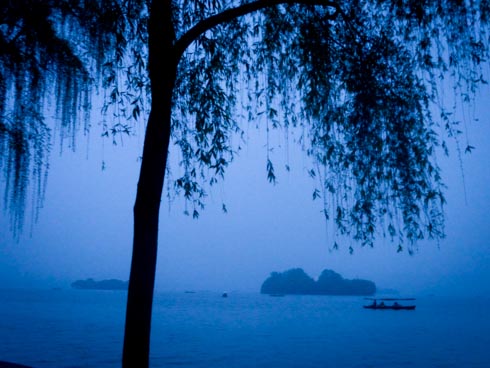Pre-Globalism
[Translations: Japanese]

Tourism is at least 1,000 years old. Ancient Chinese accounts record a parade of tourists coming to gawk at West Lake in Hangzhou (contemporary scene above), then the capital of China in the Song Dynasty. Emperors prettified the lake with causeways, pavilions, and stone bridges to woo and impress visitors. People came just to see the sights, which is the definition of tourism.
While there was some tourism then, and even earlier in Roman times, it was rare and limited to a few places. Today there is not a town in the world that does not see at least a few tourists in a month. Globally, tourism is a trillion dollar industry. We underestimate the consequence of the constant mixing that tourism produces. The term globalism encapsulates many things; one of them is simply the awareness and experience of others far away. Some of this global experience comes via movies and websites — being able to inspect other ways of living — but much is increasingly coming from the eye witness during travel. Travel is no longer a luxury of the rich, but an expectation of the middle class.
It made the switch somewhere around 1970s. Prior to that time, travel into remote otherness and wholly alien cultures took a great deal of resources. You needed connections, letters of credit, introductions, porters to move luggage, help in moving money, and you need a wad of money. Visiting a tribe required a great deal of planning, and a network of expert support. Anything outside of a city was an expedition. An expedition was not done casually. But the final result of all that planning and preparation was entry into a separate reality, a different culture with different norms and only small areas of overlap with home. Few could afford this treat, but it was very potent for those who did. It was the realm of missionaries, anthropologists, and explorers.
Fast forward to today when nearly anyone can zoom to the most distant place. With almost no exaggeration I can arrive in the most remote place on earth in 3 days, with no advance planning, and not much money. Within less than 24 hours from my bedroom I can be at 95% of the locations of the world, squatting in someone’s hut. It might cost two week’s worth of income for most people. But while it is now super easy to go into any culture, including tribal life, this culture has much in common with home. It is not as different as it once was. The young there will be listening to the same music, watching the same movies, studying the same things in school, using the same devices. Even the remote villages of any country is deeply connected. This semi-different world is the realm of NGO aid workers, travelers, and the Pancake Kingdom of Lonely Planet cafes.
But there was a brief two decades in the 60s and 70s when anyone could get to anyplace for very little money and when they arrived, it was still not touched by globalization. There were no maps, no guidebooks, no cafes, ATMs, no forums, even no hotels. It was all surprises. That was the time I was traveling — going very deep, very different, for very cheap. Someone like me with almost no money could ride trucks and jeeps and canoes and arrive in the most medieval village in Afghanistan, or Mali, or ancient Indonesia island to experience a remarkably different and deeply alien culture. I would often have no idea at all what the next village or city would be like. It was like going on a interplanetary cruise for a few dollars.
That time is now past. There is almost no place left on earth untouched by globalism. Evidence of which is in the things sold in the market, to the cloths folks wear, to the converging conventions of signage, transportation, architecture, etc. Also the business of travel is global. You can read a review of any hotel, inn, or even home-stay on the planet, and get a orientation of the “best of” any city, with maps and chatter. You can be fully educated and only select the most interesting places (to you) to visit. Before you leave.
The bad news is that great difference is harder to find in the world (although there are pockets here and there and my hobby is to hunt them down). But the good news is that you can get to anywhere you want very cheaply and easily. Most important — there is still enough difference in most places to make travel worthwhile every time. The medicine of travel, though weaker, can still disrupt, heal, or stimulate. So I still go to different places in order to find places of difference. It can be done. It is easier to arrive but you have to choose where you arrive with more care.
But we are not going back to a pre-connected world. I am glad of that, and so are the inhabitants of those formerly unconnected places. We cannot return to the time when it was a shock (to all) for a foreigner to visit a village. Now every village gets visitors every now and then. Just as you get electricity, you get visitors. Multiplied by millions every year, the exchange produces a subtle leavening, a quite education, a silent bridging that may in the end be as powerful as electricity and roads.


